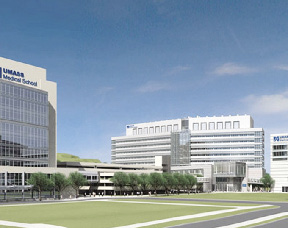State, city and local officials, students and faculty members from the University of Massachusetts, and representatives from ARC/Architectural Resources Cambridge and Suffolk Construction Company held a topping off ceremony to commemorate completion of the structural steel frame for the Albert Sherman Center, a nine-story, 500,000 s/f medical research facility at the university's medical school campus. The celebration included a speaking program and the signing of the highest structural beam by staff and faculty.
Upon its completion, the new facility will total 500,000 s/f, doubling the medical school's research capacity and expanding its educational space. Featuring a new wet lab research building, with educational and academic spaces, this building will be the latest addition to the university's campus, which has grown over the past seven years since the construction of the Aaron Lazare Medical Research Building (LRB). The Albert Sherman Center is located at the intersection of North and First Rds. and will be physically linked to the original medical school building.
ARC is overseeing all aspects of the project from design services, including programming, through construction, commissioning and closeout. The project is scheduled for completion in late 2012.
The building will be energy efficient and environmentally sustainable to meet the U.S. Green Building Council's LEED Silver standards, as well as all local, state and building energy performance standards and building codes.
"The topping off is a great milestone for this project, and marks the mid-construction point," said Arthur Cohen, a principal at ARC/Architectural Resources and principal-in-charge of the project. "Our design incorporates the campus master plan principles and is architecturally compatible with the surrounding and existing structures and buildings."
The Sherman Center will bring the advanced therapeutics cluster (ATC), the department of quantitative health sciences, the RNA Therapeutics institute and the center for experiential learning and simulation under one roof. It will be a facility where some of the world's top researchers can focus on creating new therapies for many debilitating diseases as well as facilities to support the education of the next generation of physicians in Massachusetts.
In addition to wet lab space, the new addition will include clean rooms, administrative space, a 300-seat auditorium, library, conference center, cafeteria and campus support spaces. A 1441 space garage will be built in the adjacent biotechnology research park.
About ARC/Architectural Resources Cambridge:
ARC/Architectural Resources Cambridge, founded in 1969, is one of the nation's leading architectural, planning and interior design firms specializing in educational, sports, science and technology, and corporate facilities. With an emphasis on innovative and sustainable design, the firm has garnered more than 70 awards from a wide range of professional organizations and publications. ARC's academic clients include Boston College, Duke, Harvard, Johnson & Wales, MIT, Princeton, Tufts and the University of Massachusetts, as well as a number of independent and public schools. Corporate clients of the firm include Genzyme, Abbott Laboratories, Millipore and VMware. For more information, visit: www.arcusa.com.
About the University of Massachusetts Medical School:
The University of Massachusetts Medical School, one of the fastest growing academic health centers in the country, has built a reputation as a world-class research institution, consistently producing noteworthy advances in clinical and basic research. The Medical School attracts more than $255 million in research funding annually, 80 percent of which comes from federal funding sources. The work of UMMS researcher Craig Mello, PhD, an investigator of the prestigious Howard Hughes Medical Institute (HHMI), and his colleague Andrew Fire, PhD, then of the Carnegie Institution of Washington, toward the discovery of RNA interference was awarded the 2006 Nobel Prize in Medicine and has spawned a new and promising field of research, the global impact of which may prove astounding. UMMS is the academic partner of UMass Memorial Health Care, the largest health care provider in Central Massachusetts. For more information, visit www.umassmed.edu.
Tags:
ARC holds topping off of 500,000 s/f project at UMass Medical School
June 30, 2011 - Owners Developers & Managers
 (1).png)








